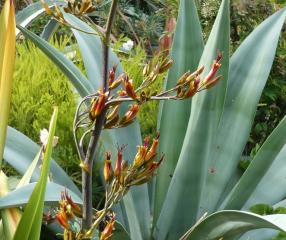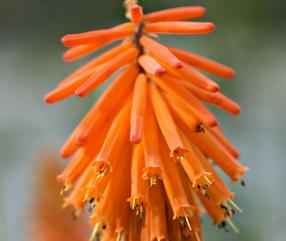Coastal gardening
Located in the South Hams, close to the coast, we naturally have a particular interest in seaside gardening and plants suitable for coastal conditions. We are always happy to advise on coastal and tender plants as well as ways to help protect your garden from the prevailing weather conditions.
Wind is the major disadvantage of coastal gardening in the South West, with the added challenge of salt, sand blasting and rabbits. The advantages are that frosts are less frequent, winters milder, spring comes early and the climate is warmer, enabling a wider variety of plants to be grown.
So, with the right choice of plants, and precautions taken to avoid the extremes of weather and the ravages of rabbits, coastal gardening can be a real delight.
Planning a coastal or seaside garden
When you acquire a garden on or near the coast, it’s tempting to rush out and plant it up with your favourite plants and shrubs or ‘must have’ impulse purchases. To get the best from you garden and for the plants to mature and survive, plan carefully! Before you start, take a while to consider:
which direction do the most damaging winds blow from?
is your garden affected by salt and sand laden winds?
is your soil sandy?
how could you provide protective shelter?
do you have a beautiful view that you want to preserve whilst still providing shelter?
which plants will best suit your soil and coastal conditions?
do you need to protect your plants from rabbits or neighbouring sheep and cattle?
can you provide enough water for your garden in the summer?
You'll then be able to plan and create a garden to thrive in your unique location.
Planting & protection
It is essential to give new or transplanted plants the best possible help to establish quickly. Use wind netting firmly fixed into the ground with treated wooden stakes to protect new planting. Ensure plants are staked firmly if necessary and tied with a suitable material. Always put tree guards on new trees.
It also helps to put water retention granules in the planting holes and to water the ground thoroughly after planting. Mulch the soil with a suitable material. Consider using a leaky pipe or hose, or similar, to cut down on watering with a hosepipe.
Rabbit damage
If rabbit damage is a problem use a barrier such as chicken wire around your garden or individual plants, or protect them with prickly shrub cuttings. If for example you use chicken wire use metre high wire and bury at least the bottom 20 cm, angling it outwards to stop the rabbits from digging under. Use stakes every metre and put a straining wire along the top. If you need a temporary barrier whilst plants establish, a 0.6m high fence is sufficient. No plants are said to be rabbit proof but in general they like dislike very aromatic plants, prickles, spines and tough, leathery leaves.
More info
for her editorial & photographic contribuition to coastal gardening
We open
9.00 am - 5.30 pm, Mon-Sun
Tel 01548 550338


Native plants for coastal gardens
Camomile, Sea Campion, Sea Holly,
Sea Spurge, Sea Kale, Sea Lavender,
Lyme Grass, Horned Poppy, Echiums,
Thrift, Valerian, Spring Squill
Hardy exotics for coastal gardens
Astelia, Asclepias, Aeonioum, Aloes, Argave, Cannas, Cestrum, Datura, Dicksonia (tree ferns), Echium pininana & Webbii, Embothrium Coccineum, Errobotyra Japonica, Felecia, Galtonia Candicans, Hedichiums, Leptospernum, Melianthus, Musa Bajoo, Prostanthera, Salvia, Yucca
